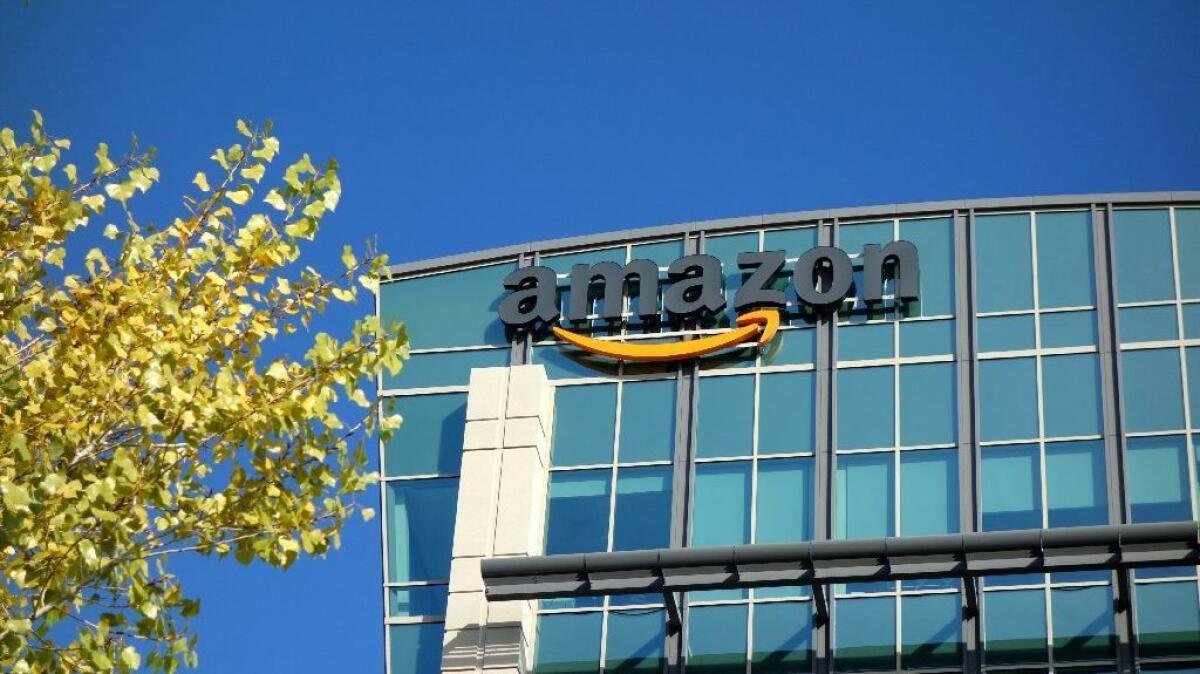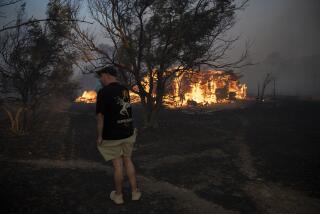Newsletter: California Inc.: Deadline looms to ask Amazon to prom — er, bid for new HQ

Welcome to California Inc., the weekly newsletter of the L.A. Times Business Section.
I’m Business columnist David Lazarus, and here’s a rundown of upcoming stories this week and the highlights of last week.
Investors on Monday will feel a tailwind from Friday’s announcement that consumers increased their spending last month by the most in 2½ years. Retail sales rose 1.6% in September, after slipping 0.1% in August. Auto sales jumped 3.6%, the most since March 2015. Gas sales climbed 5.8%, the most in 4½ years.
LOOKING AHEAD
Now hiring: J.C. Penney will hold a nationwide job fair at all its stores Tuesday to fill more than 40,000 temp positions for the coming holiday season. The Texas-based department store operator said it’s looking for cashiers, workers to restock its stores and beauty consultants to work at in-store Sephora makeup shops. October is prime time for retail hiring as firms get ready for the seasonal rush. Amazon says it will be hiring 120,000 holiday workers.
Travel ban: President Trump’s latest travel ban goes into effect Wednesday. The new measure bans entry by most citizens of Syria, Libya, Iran, Yemen, Somalia, Chad and North Korea. It also imposes restrictions on a small number of citizens from Venezuela and additional screenings for Iraqis. The ban allows for some exceptions, such as for Iranians who are students or participants in cultural exchange programs.
Amazon HQ2: Thursday is the deadline for cities vying to become Amazon.com’s “second home” to submit their bids. The online retailing giant announced in September that it was looking for a second headquarters because its current Seattle headquarters is brimming with 40,000 workers following the company’s remarkable growth. Many cities — including Los Angeles and Irvine — have been trying to woo Amazon.
Netflix hike: Netflix will begin notifying its customers Thursday of coming price increases, giving them 30 days to accept the higher rates, switch to a cheaper plan or cancel the service. Netflix will begin charging $11 a month instead of $10 for a plan that allows subscribers to simultaneously watch programs on two Internet-connected devices. The price for a plan that includes ultra-high-definition video will rise 17%, to $14 a month from $12.
Money in politics: The state Fair Political Practices Commission will consider proposals Thursday that would make it easier to give money to entities used by lawmakers facing criminal or civil investigations, or those facing recall from office. Richard Rios, an attorney who normally represents Democratic lawmakers, has asked the commission to remove limits on donations to legal defense funds and ballot measure committees.
THE AGENDA
Crowded airports and blizzard-related cancellations get most of the headlines, but for some passengers, the holiday travel headaches start weeks in advance with the hunt for flights. Which tickets guarantee a family with small kids can sit together? Complicating the hunt for airline tickets this year are the added options travelers now face when booking seats, including a wider availability of no-frills basic economy fares and bundles of extras that can be purchased for additional fees.
STORY LINES
Here are some of the other stories that ran in the Times Business section in recent days that we’re continuing to follow:
Weinstein: Disgraced Hollywood movie producer Harvey Weinstein was expelled from the Academy of Motion Picture Arts and Sciences during an emergency Saturday meeting following mounting sexual assault and harassment allegations. The rare move reflects how the movie industry is scrambling to distance itself from Weinstein, as the scandal raised uncomfortable questions about the culture of Hollywood. Weinstein had already been fired from his namesake company, which is battling to stay afloat. Read here for full coverage.
Healthcare: President Trump moved to scale back rules on health insurance across the country in the administration’s most ambitious effort to date to use its regulatory powers to undermine the Affordable Care Act. He also said the federal government will cease crucial payments to health insurers that provide coverage to low-income Americans. As a result, California’s health insurance exchange said it has ordered insurers to add a surcharge to certain policies next year.
Toyota campus: Irvine developer Sares Regis is buying the sprawling Toyota office complex in Torrance that was formerly the Japanese car manufacturer’s North American headquarters. The sale of the 110-acre campus with 2 million square feet of office and industrial space is expected to close this month, according to people who know about the deal. The price has yet to be disclosed but could surpass $150 million.
Vineyards survive: As the Napa and Sonoma valleys struggle with the effects of raging fires that have claimed at least 40 lives, many vineyards in the nearly 100,000-acre burn areas appear to be emerging relatively unscathed. Fire officials have said they considered the relatively open space of vineyards, which hold more moisture than oak forests, to be a natural firebreak that allowed their forces to concentrate on protecting populated areas and structures.
Tube travel: Richard Branson’s Virgin Group has invested in Hyperloop One, a Los Angeles company that is developing a super-fast transport system and soon will change its name to Virgin Hyperloop One. Branson, the billionaire whose other holdings include Virgin Atlantic Airways and the Virgin Galactic spacecraft venture, also joined the board of Hyperloop One. The company held its latest test run of a transport pod in a tube in late July in the Nevada desert.
WHAT WE’RE READING
And some recent stories from other publications that caught our eye:
Distressed property: In the aftermath of the flooding set off by Hurricane Harvey, opportunistic investors have arrived in Houston eager to buy water-damaged homes at bargain prices, reports Bloomberg. “It’s axiomatic on Wall Street that the time to buy is when fear overtakes greed — when blood (or, in this case, water) is in the streets. Now some are eyeing the billions of dollars in hurricane-ravaged property in Texas and Florida and deciding it may be the time to take out their checkbooks,” says Bloomberg Businessweek.
Disconnecting: A growing number of Silicon Valley tech company insiders are trying limit their use of the Internet, reports the Guardian. Even people who make their living on Internet products are becoming increasingly fearful of how tech products are affecting them. “There is growing concern that as well as addicting users, technology is contributing toward so-called ‘continuous partial attention,’ severely limiting people’s ability to focus, and possibly lowering IQ.”
BFFs: The Washington Post profiles Thomas J. Barrack Jr., an Arab American L.A. billionaire who is one of President Trump’s most trusted confidantes. Barrack admits being “shocked” by some of the president’s rhetoric and tweets and disagrees with “his efforts to ban immigrants from certain Muslim countries and his push for a border wall with Mexico. He wonders why his longtime friend spends so much of his time appealing to the fringes of American politics.”
Rustic look: In a sign of shifting fashion in the workplace, businessmen are ditching their briefcases and instead carrying around backpacks, reports the Wall Street Journal. “Enter an office elevator in any city, and you’ll spot nearly as many backpacks as tightly gripped Starbucks cups. While besuited businessmen haven’t entirely abandoned briefcases and messenger bags, the backpack is gaining ground.”
SPARE CHANGE
Amid the healthcare headlines of recent days, I found myself oddly reassured by this informative video from our friends at the University of Minnesota. It explains how the pharmaceutical industry relies heavily on compounds found in plants, fungi and bacteria, which, it turns out, are the Chuck Norris of the natural world.
For the latest money news, go to www.latimes.com/business. Mad props to Scott J. Wilson for helping put this thing together.
Until next time, I’ll see you in the Business section.
More to Read
Inside the business of entertainment
The Wide Shot brings you news, analysis and insights on everything from streaming wars to production — and what it all means for the future.
You may occasionally receive promotional content from the Los Angeles Times.









